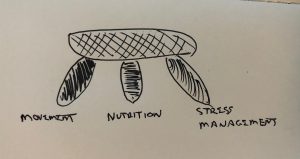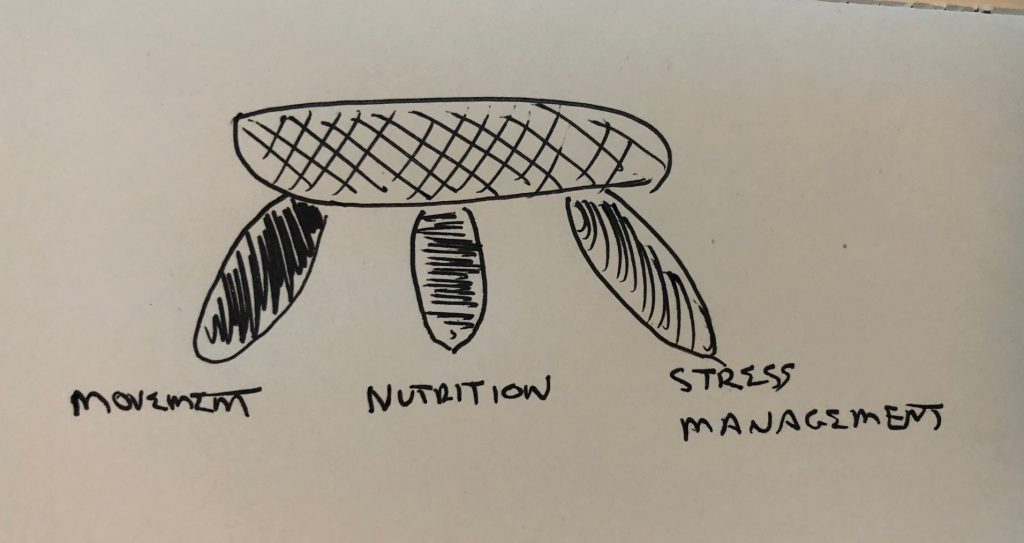If you’re on the path of fat loss, strength gains, or performance improvements, you have to remember: to be an optimally healthy human, you’ve got to act like an optimally healthy human. It’s not enough to just lose weight, or lift heavy, or crush at your sport of choice. You must consider how your goals impact your life, and how your life impacts your work towards your goals.
With the goal of improving your health, your life, and your performance, consider a three-legged stool:

The three legs are movement, nutrition, and stress management. To make this stuff work, you’ve got to consider all three.
We started with the first leg, movement, added the second leg, nutrition, and now we’re moving onto the third leg, stress management.
Some days, I feel like all I have to offer into the world is bad news.
“Weight loss is primarily a game of consistency; no days off, lots of patience, no quick fixes, and ideally, no pizza.”
“You’re going to die. All you can do is make the most of the time you’ve got.”
“You can’t out-train a bad diet.”
“What worked for your friend, spouse, or favorite Instagram personality most likely won’t work for you.”
“There are no quick fixes, to anything.”
Damn, I’m an asshole, aren’t I? Nothing but negativity.
So why don’t I throw one more out, the one that’ll really screw with your head:
The more you stress about weight loss or strength gains or performance improvements, the slower they’ll come, even to the point of zero progress.
Seriously, that’s some crap, right?
As a kid, as the holidays or a birthday approached, you probably got excited. You told your parents what you wanted as a gift, and you had a sense that you were going to get to open that present on the day. (Maybe you did, maybe you didn’t. If not, I’m sorry, truly. Have you recovered?)
From that experience, you learned an important lesson: ask for something, wish for it, think obsessively about it, and you might get to unwrap that gift.
So when it comes to body transformation, the same idea applies: wish for it, work for it, think obsessively about it, and you’ll get what you want.
Sorry, probably not.
See, the problem is the “obsessively” thinking. When you spend every minute of the day thinking about food, and training, and how you look, obsessively worrying about losing weight or getting stronger, that’s a source of stress. And the body’s response to stress is predictable: stunted digestion and absorption of nutrients (that big salad is worth less when you’re stressed), heart rate and blood pressure go up, and you’re more likely to make bad decisions (chocolate cake? day off from the gym?).
What’d I tell you. I’m an asshole. I just told you that the more you stress out about your goals, the less likely you are to meet them, and the more likely you are to do things that move you in the opposite direction.
“Fuck you, coach.”
Yep, I get it. I feel the same way. And I didn’t believe it other, until I started exploring the topic of “cognitive dietary restraint.”
Here’s something to remember: your brain doesn’t know the difference between external stress (“I’m going to be eaten by a bear!” “By child’s getting crushed under that car!”) and internal stress (“I’m worried about money!” “I hate the way I look!”). Your brain, and therefore your body, respond exactly the same:
- Increased heart rate, breathing, and blood pressure
- Decreased digestion and nutrient absorption
And when that stress is chronic – thinking about the stressors all the time – your body never gets a break, and it is continually freaking out. That’s a recipe for disaster, and never reaching your goals. And it’s backed by science.
But it’s not just about the stress of trying to meet your goals.
- Do you spend 30 minutes a day in movement of some sort?
- Do you sleep 8 or more hours a night? Do you drink 2-3 liters of water a day?
- Do you have a community of like-minded people around you?
- Do you eat primarily high-quality, unprocessed foods, and a bunch of lean protein each day?
How many “nos” did you collect? Each one represents additional stress in your life, and each one will hold you back from making the fastest possible progress towards your goals.
Stress management doesn’t mean removing stress.
Stress is a fact of life, and that’s a good thing. Stress makes us stronger, more resilient. When we experience stress, and then – listen up, this is important – you adequately recover from that stress, your body adapts, and you’re better than you were.
Yes, you may be able to remove some stressors – drink more water, eat better food, get more sleep – but some stressors are consitent. You probably have to work. You may have a family. You’ve probably got more to do than you have time for. So this is where I go all Buddhist on you:
Your problem isn’t the problem; your problem is your reaction to the problem. In other words, life is what it is; what matters is how you respond to it. Stressors are a fact of life; how you use that stress, how you respond to it, will determine the impact it has on you.
What can you do?
Slow down. Spend some quiet time with your thoughts. Turn off all media and get on the floor and move around. Take a yoga class. Meditate (I especially love the Headspace app). Read a book. Make a list of 50 things that you have going for you. Say “thank you” to 10 people each day

